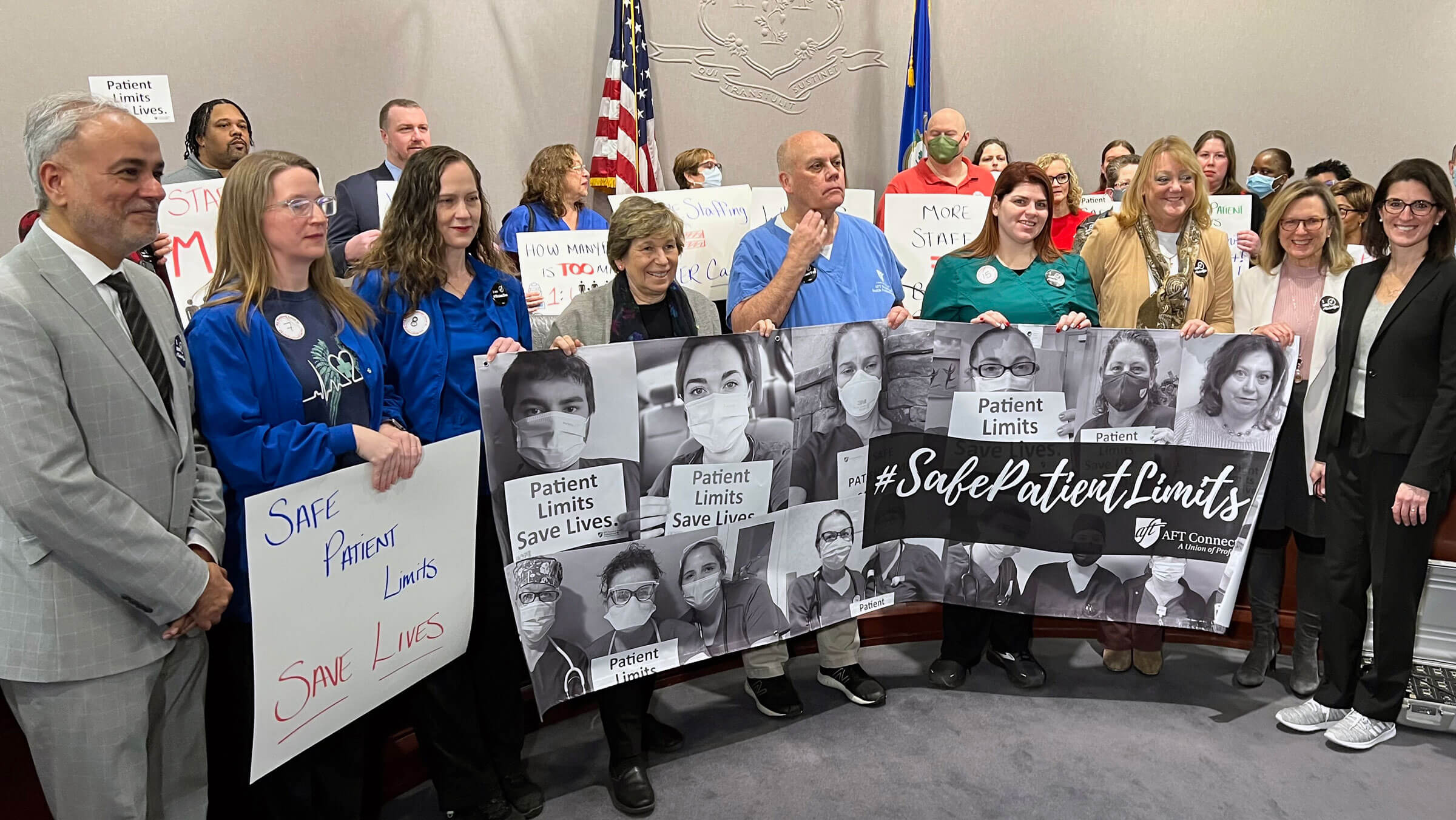What unions do
Unions’ ‘business’ is making life better for people.

Weingarten, center, with healthcare workers at a safe-staffing briefing at the state Capitol in Hartford, Conn., on Jan. 23.
Several years ago, The Atlantic ran a story whose headline made even me, a labor leader, scratch my head: “Union Membership: Very Sexy.” The gist was that higher wages, health benefits and job security—all associated with union membership—boost one’s chances of getting married. Belonging to a union doesn’t actually guarantee happily ever after, but it does help working people have a better life in the here and now.
Workers who join together in unions have higher pay and better healthcare and retirement benefits than nonunion workers, and the advantage is especially strong for Black, Hispanic and female workers and workers with disabilities. Those effects are life-changing.
So, too, is the work the American Federation of Teachers and other unions do. Most know us as an education union, but today the AFT is the nation’s fastest-growing healthcare union. And healthcare workers are under siege. That is why the AFT launched a $1 million campaign, “Code Red: Understaffing = Patient Care Crisis.” We are fighting to make sure that when someone in your family has a medical emergency, there are enough nurses on hand to provide quality care.
Families are going through so much these days, and we see it in schools. So we’re pushing for 25,000 more community schools to meet kids’ academic, social, emotional and physical needs. We’re advocating for the pay, benefits and respect that educators deserve, and for the resources and learning conditions that students need—all of which will help solve the teacher shortage crisis and help kids recover and thrive. And we’re promoting experiential learning, including career and technical education, that engages students through critical thinking, teamwork and learning by doing. Unions’ “business” is making life better for people.
Americans’ support for labor unions is at the highest level in more than half a century. And a majority of nonunion workers (nearly 60 million American workers) say they would join a union if they could. Why, then, has union membership plummeted to the single digits?
One cause is five decades of efforts by corporations and their allies to decimate unions in the United States. Some of the most costly and concerted efforts to crush unionization drives are happening today—at Amazon, Starbucks and other hugely profitable corporations. There are few or no consequences for powerful employers when they violate workers’ legal right to form a union. That’s why congressional Democrats have reintroduced the Protecting the Right to Organize (PRO) Act, with the support of President Joe Biden.
Another reason for the decline in union membership is that, as journalist David Leonhardt has observed, many Republican government officials “treat organized labor as their political enemy.” When unions focus voters on economic issues, he wrote, “they become more likely to vote for a Democrat.” Rather than win voters by meeting their economic needs, these Republicans are trying to take voters’ economic freedom away, like former Wisconsin Gov. Scott Walker did and Florida Gov. Ron DeSantis is trying to do right now.
Columnist Jamelle Bouie described it this way: “Republicans and other conservatives … know that organized labor is a key obstacle to dismantling the social safety net.”
That’s true. Many conservative politicians see safety net programs as a piggy bank to pay for large tax cuts for the wealthy and for corporations, and they see unions as the last roadblock to eviscerating them. What are these programs? They protect us from the most devastating consequences of job losses, economic hardship and disability. They help shield children from the misery of extreme poverty. And they help elderly Americans afford the food, healthcare and housing they need to survive. If protecting the most vulnerable Americans makes unions the enemy of politicians who would harm them, so be it.
Many right-wing politicians don’t just find us a nuisance to their agenda, they actively want to destroy unions, and work to pass “right-to-work” laws, which allow workers to take the benefits the union secures without paying for them. By using these laws to weaken unions, their end goal is to destroy their main political opponent and the last major check on their corporate cronies’ power.
But workers are undaunted. In the last month alone, the AFT has welcomed into our union hospital staff in Vermont, nurses and other healthcare professionals in New Mexico, medical technicians in Michigan, and teachers and other school staff at the Maryland School for the Deaf. And Michigan is returning to its pro-worker roots by repealing the state’s 2012 “right-to-work” law.
Perhaps the strongest argument for unions and collective action is also the simplest: Individuals can be powerless to effect change, but together we can tilt the balance of power so working people and our families have better lives, our democracy works and our country can move forward. That is what a workers’ right to organize a union means. It’s a way to strive for something better for ourselves and for our country.













